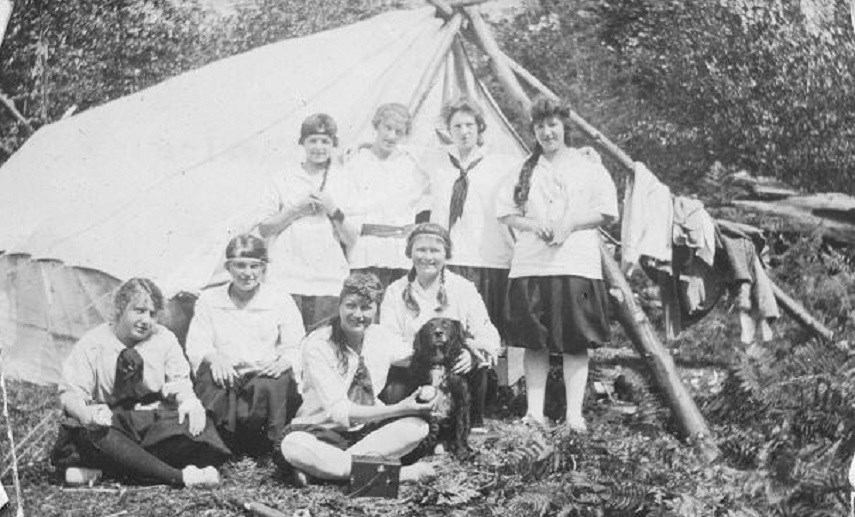The West Vancouver Girl Guides chapter is celebrating its centenary this weekend, as it looks to continue the strong tradition of instilling confidence and self-reliance in generations of women and girls.
What would usually have been celebrated with a camp, the ongoing COVID-19 pandemic has meant the chapter will come together at Whytecliff Park later today (Nov. 6), in effort to mark the occasion permanently.
In preparation for the day, guides aged 12 to 14 have been clearing the area of invasive species. On Saturday, the chapter (which has around 100 members) will replant the area with natives, such as salal, Oregon grapes, elderberries, huckleberries, and a few small trees, thanks to the generosity of the West Vancouver Foundation and West Vancouver Parks Department.
Daphne Hales, who has been involved with guiding in West Vancouver for more than 50 years, says it will be a learning opportunity for the guides, too.
“The kids will learn how to plant properly -- how to get a plant out of a plant pot, dig holes, and plant them,” she said.
Although the first chapter in the Lower Mainland began over 10 years earlier, it wouldn’t be until 1921 when Phyllis Munday would bring the English guiding movement to West Vancouver. She immigrated to the North Shore with her family in the early 1900s.
Hales says Munday was an incredible botanist, mountaineer, and nature lover. Along with Annette Buck, she was the first woman to reach the top of Mount Robson in 1924, and was awarded the Order of Canada in 1972 thanks to her work with the Girl Guides.
“She used to take the guides on walks to Lighthouse Park and Whytecliff Park. And later, the [guide] leaders, to teach them about nature and the importance of the environment,” Hales said.
Nature House closed since COVID
Since 1985, the chapter has had the use of a hut nestled in Lighthouse Park, now the “Phyl Munday Nature House.” Hales notes the relationship between then mayor Derrick Humphreys and the guides was pivotal in making a dedicated space for the chapter a reality.
“Helping the local community, and service projects, is a big part of guiding. So, opening the nature house to the public has really been an ongoing service project now, for 35 years,” she said.
With the ongoing pandemic, the nature house has been closed to the public since March 2020 but Hales says prior to the closure, it would see between 3,000 and 4,000 visitors annually.
“It's very well received. People just love it,” Hales said. “It's been a really rewarding thing to do. And the girls are down there a lot, having meetings and workshops on all kinds of different natural topics.”
When first introduced, the guiding program had 10 guiding laws – one of which was “a guide smiles under difficulty.”
Over the decades, Hales has seen a dramatic shift in what the guiding movement stands for. No longer emphasizing competition, individuality, or a "stiff British upper lip," it has shifted to self-confidence, self-reliance, and teamwork.
“And as the world changed, girls became far more independent, and yet became more vulnerable. Say a girl is being bullied or harassed, we don't want her to smile and accept it, we want her to be able to stand up for herself,” Hales said.
But it’s not just the movement’s emphasis, the skills and badges it offers, have also changed.
Self-reliance and service to others
“Nowadays, the whole needlework stuff has just disappeared, we don't even talk about it. But we have an astronaut badge, computer badges, and science badges,” she said. “But the ideas of being self-reliant, of being good campers, of being healthy, of hiking, service to others, and teamwork, those things have remained constant, but they're just taught in different ways.
“It has been going strong for 100 years, and still is. We have wonderful leaders and volunteers,” she said.
The West Vancouver Girl Guides will be at Whytecliff Park today, Saturday, Nov. 6, between 1 p.m and 3 p.m.
This story has been amended to correct an error. An earlier version stated the event is at Lighthouse Park, when in fact it is at Whytecliff Park.



